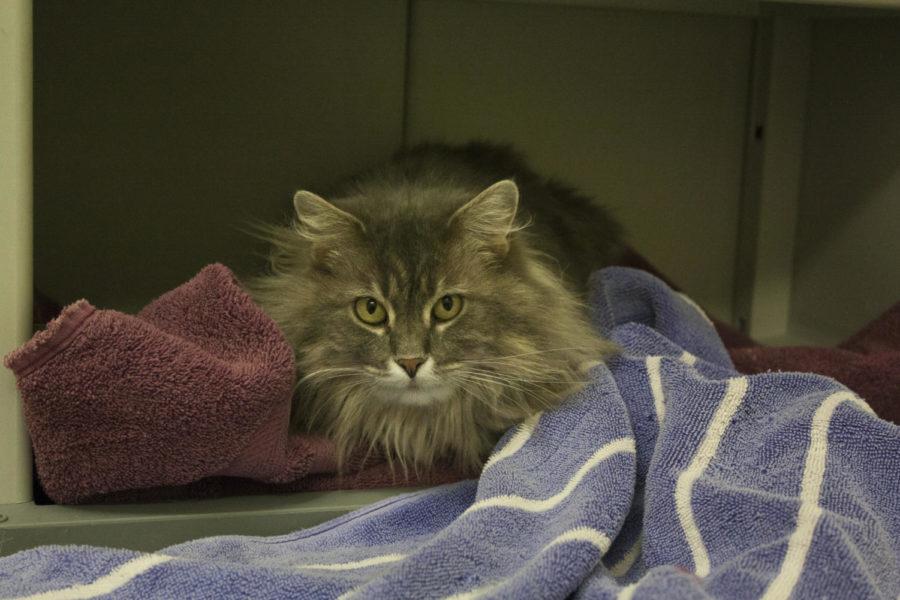Maddie’s Fund helps shelter animals, veterinary students succeed
Maddie’s Fund helps shelter animals stay healthy and become more adoptable, like Mimi, a homeless cat staying at the Ames Animal Shelter.
March 11, 2013
Established in 1999 by Dave Duffield and his wife Cheryl in memory of their miniature schnauzer, Maddie’s Fund has given more than $118 million to help and save the lives of shelter animals all over the country.
Veterinary colleges in the United States are awarded grants by Maddie’s Fund to aid in educating students of the importance of shelter medicine.
Maddie’s has funded the ISU College of Veterinary Medicine since 2002, making Iowa State the longest-standing university to be funded by Maddie’s.
“We are very excited about it and very grateful to Maddie’s Fund,” said Dr. Claudia Baldwin, director of Maddie’s Shelter Medicine Program at Iowa State.
The College of Veterinary Medicine has several programs and opportunities available to students, including externships, engagement and interaction with local sheltering communities, and courses in animal shelter medicine.
“We offer several one-credit elective courses that students can take during their first through third year of veterinary school. These courses are the foundation of the whole program,” Baldwin said.
The courses are taught by faculty, but also by experts from other U.S. veterinary medicine universities as well.
“We bring in external experts in the field of shelter medicine electronically from all over the country to speak to the students,” Baldwin said.
Local experts are also brought into the classroom to speak as well.
“[Local experts] are hugely important in this entire process, and we bring them in to speak year after year because they are so important,” Baldwin said.
The content of the courses and externships help the graduates in the long run.
“Our students are highly sought after,” Baldwin said, smiling. “I’ve been told that other universities are not just interested but fight over our graduates.”
Another component of the shelter medicine program is the hands-on experience the veterinary students receive.
“We offer more fourth-year training than almost any other university,” Baldwin said.
Students are sent to three core shelters: Animal Rescue League of Iowa in Des Moines, Nebraska Humane Society in Omaha, Neb., and Wayside Waifs in Kansas City, Mo., to handle the shelter animals, perform surgery and become educated on preventing overpopulation and disease control.
“In 2012, we sent roughly 88 to 94 students to shelters who received 7,200 dogs and 8,800 cats. Our students performed 2,500 spay and neuter procedures and 2,500 dental treatments,” Baldwin said.
With the university’s shelter medicine program, students are able to gain valuable surgical experience.
“It’s what sets us apart the most,” Baldwin said.
Shelter medicine is different than standard veterinary medicine.
Dr. Laura Anderson, Clinician of Maddie’s Shelter Medicine Program at Iowa State, explains the difference as a matter of “herd health.”
Veterinarians always need to be aware of individual animals, Anderson said, but in shelter health, they must focus on the population.
“It’s herd health for companion animals. We’re so used to thinking of herd health in larger production animals, but there’s a real disconnect between it and companion animals, which is the problem,” Anderson said.
Because of Maddie’s Fund, Iowa State is able to send students to local shelters to perform free spay and neutering surgeries. Anderson is part of this program.
“It greatly benefits both the students and the shelters,” Anderson said. “Our students gain valuable surgical experience, and it’s free to the shelters which benefits them because it’s expensive to pay for the procedures.”
Maddie’s Fund is leading the way in shelter medicine education and in funding universities and shelters so that homeless animals have a brighter future.
“As we are moving forward in the future, we know that this [shelter medicine] is something very important,” Baldwin said. “Maddie’s Fund is helping us get there, and we will get there.”

















